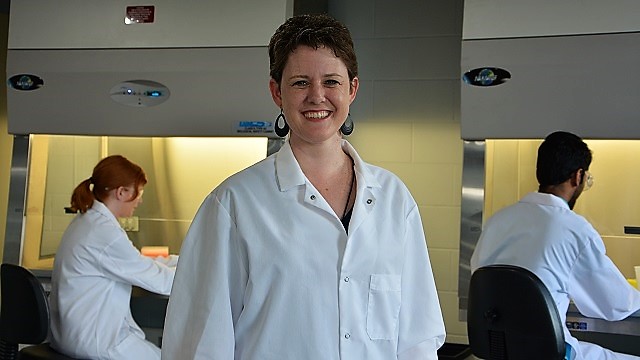A Southern Research scientist’s early-stage work on potential new therapies for amyotrophic lateral sclerosis, or ALS, is getting a push thanks to a grant that will speed the project.
Rita Cowell, Ph.D., Fellow and Chair of the Neuroscience Department in Southern Research’s Drug Discovery division, is studying compounds that in lab tests have prevented the neuronal loss that is a hallmark of ALS, a devastating condition characterized by muscle atrophy and paralysis.
The Alabama Power Foundation grant will permit her to accelerate her research into these compounds and to gather the extensive scientific data needed to apply for substantial federal funding opportunities.
“In this internal project, we’re actually working on two areas of ALS research,” Cowell said. “One is related to drug discovery, and the other focuses on understanding the biology of this debilitating disease.
“We don’t have additional resources to devote to this work, so this grant allows us to expand our studies, which have a lot of potential.”
NOVEL TREATMENTS

ALS is a progressive neurodegenerative disease that affects nerve cells in the brain and the spinal cord, killing motor neurons in the body that control movement. It’s sometimes called “Lou Gehrig’s Disease,” after the baseball great from the 1930s.
The ALS Association says the condition, which usually strikes people between the ages of 40 and 70, affects at least 16,000 Americans at any given time. The average life expectancy of an ALS patient is two to five years from the time of diagnosis, the group says.
Cowell said there are only two FDA-approved drugs to combat the disease, and while these medicines have been shown to slow the progression of ALS, they don’t help some patients at all. That leaves them with no treatment option.
“There is a desperate need for new drugs for ALS,” she said.
Myla Calhoun, President of the Alabama Power Foundation, said the grant provided to Cowell’s team can help to deepen the understanding of this devastating disease and contribute momentum to promising drug discovery efforts.
“Health and Human Services is one of the five focus areas of the Foundation and we hope this grant will help position our state as a leader in medical research and development,” said Calhoun. “Southern Research is uniquely positioned to make progress in this area, and our grant will allow its Drug Discovery team to continue moving therapies closer to patients in need. “
CELL DEATH TRIGGER
Working in Southern Research labs, scientists have identified compounds that have the potential to counteract the cell death that is a central feature of ALS. This neuronal loss is tied to an overabundance of what is called “reactive oxygen species,” or ROS, a stress response that leads to cell death.
“Certain cells, like the motor neurons that are lost in ALS, have been shown to be sensitive to this stress response over time,” Cowell said. “The compounds we have identified could boost the ability of these neurons to counteract the stress response and protect them from cell death.”
To move the project forward, Cowell’s team will conduct key tests of the compounds in a series of cell-based assays to gauge how the chemicals work against ALS. The data could provide a pathway to government or commercial funding for tests in mouse models of ALS and eventually Phase I clinical trials.
“This drug discovery research is in its very early stages, so we don’t expect to have a lead compound in a clinical trial after one year of funding,” Cowell said. “But the grant from the Alabama Power Foundation will help us move toward our long-term goals of discovering new approaches and therapeutics to treat ALS.”
Cowell’s team in Southern Research’s Neuroscience Department focuses on the mechanistic underpinnings of why people develop neurological diseases and disorders such as Alzheimer’s, Parkinson’s, ALS, schizophrenia and depression.